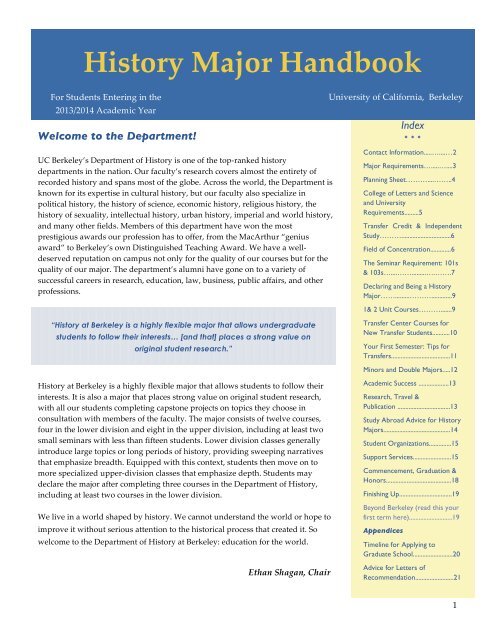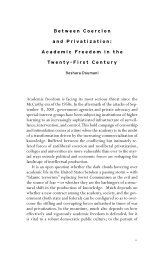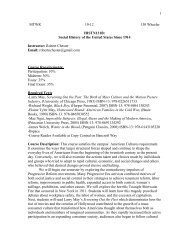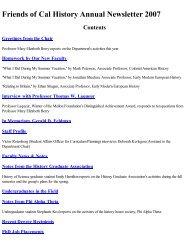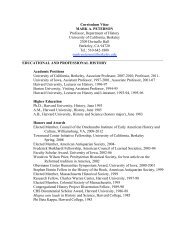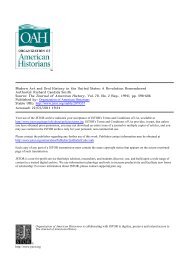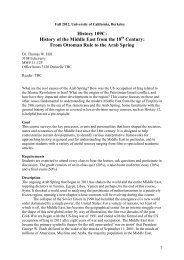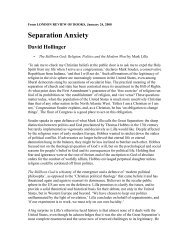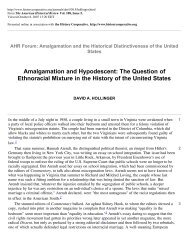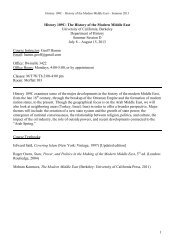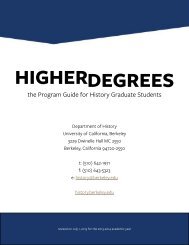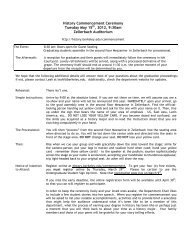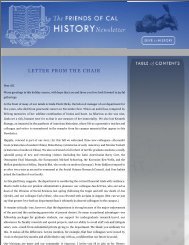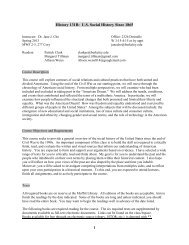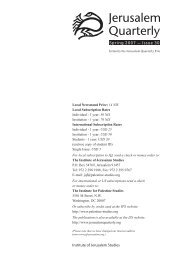History Major Handbook - Department of History, UC Berkeley
History Major Handbook - Department of History, UC Berkeley
History Major Handbook - Department of History, UC Berkeley
You also want an ePaper? Increase the reach of your titles
YUMPU automatically turns print PDFs into web optimized ePapers that Google loves.
<strong>History</strong> <strong>Major</strong> <strong>Handbook</strong>For Students Entering in the2013/2014 Academic YearWelcome to the <strong>Department</strong>!University <strong>of</strong> California, <strong>Berkeley</strong>Index• • •<strong>UC</strong> <strong>Berkeley</strong>’s <strong>Department</strong> <strong>of</strong> <strong>History</strong> is one <strong>of</strong> the top-‐‐ranked historydepartments in the nation. Our faculty’s research covers almost the entirety <strong>of</strong>recorded history and spans most <strong>of</strong> the globe. Across the world, the <strong>Department</strong> isknown for its expertise in cultural history, but our faculty also specialize inpolitical history, the history <strong>of</strong> science, economic history, religious history, thehistory <strong>of</strong> sexuality, intellectual history, urban history, imperial and world history,and many other fields. Members <strong>of</strong> this department have won the mostprestigious awards our pr<strong>of</strong>ession has to <strong>of</strong>fer, from the MacArthur “geniusaward” to <strong>Berkeley</strong>’s own Distinguished Teaching Award. We have a well-‐deservedreputation on campus not only for the quality <strong>of</strong> our courses but for thequality <strong>of</strong> our major. The department’s alumni have gone on to a variety <strong>of</strong>successful careers in research, education, law, business, public affairs, and otherpr<strong>of</strong>essions.“<strong>History</strong> at <strong>Berkeley</strong> is a highly flexible major that allows undergraduatestudents to follow their interests… [and that] places a strong value onoriginal student research.”Contact Information.....…....…2<strong>Major</strong> Requirements….....…....3Planning Sheet………....……..4College <strong>of</strong> Letters and Scienceand UniversityRequirements.........5Transfer Credit & IndependentStudy………...............................6Field <strong>of</strong> Concentration.............6The Seminar Requirement: 101s& 103s…....…….........….…….7Declaring and Being a <strong>History</strong><strong>Major</strong>…….........……….............91& 2 Unit Courses……….......9Transfer Center Courses forNew Transfer Students...........10Your First Semester: Tips forTransfers.....................................11Minors and Double <strong>Major</strong>s.....12<strong>History</strong> at <strong>Berkeley</strong> is a highly flexible major that allows students to follow theirinterests. It is also a major that places strong value on original student research,with all our students completing capstone projects on topics they choose inconsultation with members <strong>of</strong> the faculty. The major consists <strong>of</strong> twelve courses,four in the lower division and eight in the upper division, including at least twosmall seminars with less than fifteen students. Lower division classes generallyintroduce large topics or long periods <strong>of</strong> history, providing sweeping narrativesthat emphasize breadth. Equipped with this context, students then move on tomore specialized upper-‐‐division classes that emphasize depth. Students maydeclare the major after completing three courses in the <strong>Department</strong> <strong>of</strong> <strong>History</strong>,including at least two courses in the lower division.We live in a world shaped by history. We cannot understand the world or hope toimprove it without serious attention to the historical process that created it. Sowelcome to the <strong>Department</strong> <strong>of</strong> <strong>History</strong> at <strong>Berkeley</strong>: education for the world.Ethan Shagan, ChairAcademic Success ...................13Research, Travel &Publication .................................13Study Abroad Advice for <strong>History</strong><strong>Major</strong>s..........................................14Student Organizations..............15Support Services........................15Commencement, Graduation &Honors.........................................18Finishing Up.................................19Beyond <strong>Berkeley</strong> (read this yourfirst term here)...........................19AppendicesTimeline for Applying toGraduate School.........................20Advice for Letters <strong>of</strong>Recommendation........................211
Contact Information<strong>Department</strong> Office3229 Dwinelle Hall (Level C)University <strong>of</strong> California, <strong>Berkeley</strong>510-‐‐642-‐‐1971Mailing Address:Undergraduate Advising<strong>Department</strong> <strong>of</strong> <strong>History</strong>3229 Dwinelle Hall, #2550<strong>Berkeley</strong>, CA 94720-‐‐2550Web Address:http://history.berkeley.edu/Facebook Page:<strong>History</strong>AdvisingatCalUndergraduate AdvisingLeah FlanaganUndergraduate <strong>Major</strong> Advisor3327 Dwinelle Hall (Level C)510-‐‐642-‐‐0356leahf@berkeley.eduDrop-‐‐in Advising 9-‐‐12 and 1-‐‐4, Monday -‐‐ FridayErin Leigh InamaUndergraduate Minor Advisor3312 Dwinelle Hall (Level C)510-‐‐642-‐‐2378history-‐‐recruitment@berkeley.eduKira Blaisdell-‐‐SloanStudent Services Coordinator3313 Dwinelle Hall (Level C)510-‐‐643-‐‐8995history-‐‐ssc@berkeley.eduPeer AdvisorsMain Office, 3229 DwinelleNames, fields and drop-‐‐in hours will be posted in early Fall.FacultyTo find our faculty, please see <strong>of</strong>fice hours and emails posted on our website or on the wall by the main<strong>of</strong>fice door (3229 Dwinelle Hall).2
<strong>History</strong> Undergraduate Program RequirementsFor Students entering in the 2013/2014 YearStudents may declare the major after completing three letter-‐‐graded courses in the <strong>Department</strong> <strong>of</strong> <strong>History</strong> with a 2.0grade point average or better. This must include at least two courses in the lower division.Lower Division RequirementsFour courses at <strong>UC</strong> <strong>Berkeley</strong> (or their equivalentsin a history department elsewhere), to include:• one survey course in the history <strong>of</strong> the UnitedStates (7A or 7B)• one survey course in the history <strong>of</strong> Europe (4A,4B or 5)• one survey course in the history <strong>of</strong> anotherworld area (3, 6, 6A, 6B, 8A, 8B, 10, 11, 12, 14)• one elective (any <strong>of</strong> additional course listedabove, or <strong>History</strong> 2, 30 or 39)Note that <strong>History</strong> R1B, 24, 84 and 98 do not fulfill anymajor requirements.Students may substitute one “survey-‐‐like” upper-‐divisioncourse for any one <strong>of</strong> the first threerequirements, in consultation with the undergraduateadvisor.Upper Division RequirementsEight courses, to include:• at least one proseminar (<strong>History</strong> 103)• one senior thesis research seminar(<strong>History</strong> 101)• at least four <strong>of</strong> the eight upper-‐‐divisioncourses, including the 101, must constitutea Field <strong>of</strong> Concentration.Field <strong>of</strong> Concentration RequirementEach Student is required to define a “Field <strong>of</strong>Concentration” within the discipline whichlinks together four courses, including their<strong>History</strong> 101. The three additional courses in theField may include <strong>History</strong> 103. They may alsoinclude one appropriate upper-‐‐division course(<strong>of</strong> at least three units) from anotherdepartment (to have this course approvedplease bring a syllabus to the undergraduateadvisor).Students must submit the Field <strong>of</strong>Concentration form (online) two semestersprior to graduation (thus, for example, duringthe spring <strong>of</strong> the junior year for majorsexpecting to graduate the following spring) inorder to secure approval for their Field <strong>of</strong>Concentration from the Committee on the<strong>History</strong> Undergraduate <strong>Major</strong>.Premodern RequirementAt least one course (as one <strong>of</strong> the twelverequired courses) devoted entirely topremodern history to be selected from coursesfocused on one or more <strong>of</strong> the following eras:Antiquity, the Classical Period, and theMedieval Period. Courses dealing solely withthe Early Modern Period do not satisfy thisrequirement. This may be either an upper orlower division course. A current list <strong>of</strong> coursesthat satisfy the premodern requirement ismaintained on the departmental website.Note that to be used for the major, courses must be taken for a letter grade. Additionally, aminimum grade point average <strong>of</strong> 2.0 must be maintained in courses used for the major overalland at the upper division.3
<strong>History</strong> <strong>Major</strong> Planning SheetThis worksheet is a planning aid, not a commitment. Use it as a guide. Think about what you wantto get out <strong>of</strong> your major and what courses will fulfill that purpose. Use the <strong>Major</strong> <strong>Handbook</strong> andthe course archives on the <strong>History</strong> <strong>Department</strong> website as references.Students may declare the major after completing three lower division history courses OR two lower division survey courses plus one upperdivision lecture course.Prerequisites: With approval, one <strong>of</strong> the first three may be an upper division lecture, but it cannot then appearin the Upper Division list as well.Course Semester Grade(1) Europe ________________ __________ ________(2) US ________________ __________ ________(3) Other World Area ________________ __________ ________(4) Elective ________________ __________ ________Students may take one upper division course outside the <strong>History</strong> <strong>Department</strong>, but it must be a “history” class, in the field <strong>of</strong> concentration, andapproved by the Undergraduate Advisor.Upper Division: Eight courses from 100-‐‐199, including at least one <strong>History</strong> 103, and one <strong>History</strong> 101.Course Semester Grade(1) __________________________ _______________ _______(2) __________________________ _______________ _______(3) __________________________ _______________ _______(4) __________________________ _______________ _______(5) __________________________ _______________ _______(6) __________________________ _______________ _______(7) __________________________ _______________ _______(8) 101_______________________ _______________ _______Field <strong>of</strong> Concentration Title: _____________________________________________________Courses in field, selected from the upper division list above (may include <strong>History</strong> 103):(1) ________________ (2) _______________ (3) _________________ (4) __<strong>History</strong> 101_____Pre-‐‐Modern Requirement Completed. One course is required, can be lower or upper division.<strong>History</strong> 103 Completed. One is required, but more than one is recommended. 103s fulfill the samerequirements as upper division lectures, except they cannot be used to satisfy the pre-‐‐modernrequirement.4
College <strong>of</strong> Letters and Science and University RequirementsCheck DARS to verify that your College and University requirements have been successfully completed and to seewhat you have left. Meet with a College advisor if you have any questions about these requirements.College <strong>of</strong> Letters and Science and University Requirement Checklistooooooooo6 Upper Division Units (in a minimum <strong>of</strong> two courses) Outside <strong>of</strong> the <strong>Major</strong> Completed. Note thatcourses crosslisted with history will not count.Seven Course Breadth Completed.American Cultures Requirement Completed.American <strong>History</strong> And Institutions Requirement Satisfied.Foreign Language Requirement Completed (must be for a letter grade).Quantitative Reasoning Requirement Completed (must be for a letter grade).Writing and Composition Requirement Completed.Unit Requirement Met.Residency Requirement Met.For details on the College and University requirements and how to fulfill them go to:http://ls-‐‐advise.berkeley.edu/requirement/summary.html or meet with a college advisor.Contact Information for L&S AdvisingDrop-‐‐in Advising (first come, first-‐‐served): Mon, Tue, Thu, Fri 9-‐‐1:30; Wed 1-‐‐3Appointments (In-‐‐Person, Phone and Skype): Call a week in advance to schedule.Phone: (510) 642-‐‐1483 (to schedule appointments or for quick questions Mon Tue Thu Fri 9-‐‐4; Wed 1-‐‐4)Address: 206 Evans Hall, <strong>Berkeley</strong>, CA 94720-‐‐2924Final Degree CheckThe semester you intend to graduate be certain to request a degree audit from the college by submitting the“Graduation Check Form” (http://ls-‐‐advise.berkeley.edu/fp/12Add_Deg_List.pdf) to L&S. This needs to besubmitted before the end <strong>of</strong> the first week <strong>of</strong> classes so that if there is a problem, they can alert you while you canstill add a class. They will send you an email confirming that you have met all <strong>of</strong> your requirements or letting youknow what you have left to do.Notes:5
Thinking About Your Field <strong>of</strong> Concentration• • •The purpose <strong>of</strong> the field is to create as much context as you can for your eventual thesis topic, to learn whichfaculty members will have the best answers to your questions, and to think about how and when and whereyour classes might connect. Keep in mind you'ʹre not bound to this plan forever; if you have a better idea later,you can change your mind.The concept <strong>of</strong> developing a field <strong>of</strong> Concentration in the history major is covered on our website here:http://history.berkeley.edu/undergraduate/fields-‐‐concentration. On that page you will also find the link to theonline field declaration form.You are expected to be able to declare your field by the end <strong>of</strong> your junior year. Transfer students, and otherswho are having trouble coming to a conclusion, may wait until they see the 103 list in the summer. Please takeadvantage <strong>of</strong> faculty <strong>of</strong>fice hours during the Fall and Spring terms to ask questions about your potential field andpotential thesis topics. One may lead to the other.If you are still having trouble deciding on a field you might try thinking about your favorite classes and whatthemes they have in common. Perhaps go back through your notes, and see what jumps out. Or workbackwards: think about what you'ʹve been tossing around as potential thesis topics. Are they in a field <strong>of</strong> somekind? How did you first think about those topics? There’s no need to be an expert at the inception <strong>of</strong> yourproject.Transfer Coursework, Independent Study & AP CreditThere are a variety <strong>of</strong> ways that you can satisfy the course requirements for the major aside from taking courses in ourdepartment. Below are the department’s policies pertaining to alternative forms <strong>of</strong> course credit.Transfer Credit and Credit for EAP Coursework. To find equivalent courses at California Community Colleges, seeassist.org. Please be aware that not every possible course is articulated on assist.org. You are welcome to ask theundergraduate advisor about any non-‐‐articulated history courses taught at a CCC. Note that community collegecourses can only be used to satisfy lower division requirements.For courses that are not articulated, including all courses taken at institutions other than California Communitycolleges, please bring a syllabus (or at least a course description) along with a copy <strong>of</strong> the transcript on which thecourse appears (un<strong>of</strong>ficial is fine) and the Course Approval Form (available on the <strong>Department</strong> <strong>of</strong> <strong>History</strong> website)when you come in to declare the major.All <strong>of</strong> the lower division requirements may be satisfied through transfer credit if the courses are articulated orapproved. A maximum <strong>of</strong> four upper division courses taken at other institutions (including those <strong>of</strong> the EducationAbroad Program <strong>of</strong> the University <strong>of</strong> California) may be applied to the major. Please be aware that you cannotsubstitute non-‐‐<strong>Berkeley</strong> courses for the 101 or 103 requirement.6
Credit for Courses Outside <strong>of</strong> <strong>History</strong>. Of the twelve courses that make up the <strong>History</strong> major, at least eleven mustbe completed within a <strong>Department</strong> <strong>of</strong> <strong>History</strong>. You may, with permission, include one upper division course fromanother department in constructing your Field <strong>of</strong> Concentration. You will need to submit a syllabus, and see theundergraduate advisor to discuss how your outside class fits into your field.Independent Study in <strong>History</strong>. Students may create an independent study project in consultation with a supervisingpr<strong>of</strong>essor in the <strong>History</strong> <strong>Department</strong> under the number <strong>History</strong> 199. (Lecturers and GSIs may not supervise <strong>History</strong>199.) With the pr<strong>of</strong>essor’s approval, <strong>History</strong> 199 may be taken for 1, 2, 3 or 4 units. A four-‐‐unit <strong>History</strong> 199 maycount once as an upper division course requirement. <strong>History</strong> 199 may only be taken P/NP and will not be counted inthe major GPA.AP Credit and On-‐‐Line Couses. The <strong>Department</strong> <strong>of</strong> <strong>History</strong> does not accept Advanced Placement credit or on-‐‐linecourses in lieu <strong>of</strong> any major requirements.The Seminar Requirement:<strong>History</strong> 101s and 103sThe department <strong>of</strong> history <strong>of</strong>fers classes on a wide range <strong>of</strong>topics, regions, and periods, and it divides classes intodifferent levels. Lower division classes generally introducemajor topics or long periods <strong>of</strong> history, providing sweepingnarratives that emphasize breadth over depth. Equipped withthis context, students are prepared to move onto morespecialized, demanding, and focused upper division-‐‐classes on particular topics. And at least twice during the major,students will take seminars – intimate, discussion-‐‐based classes where history can be explored in unmatched depth.Graduating seniors <strong>of</strong>ten report that seminars were the most challenging and rewarding classroom experiences theyhad in college. <strong>History</strong> majors are required to take at least one 103 (a proseminar), and one 101 (a senior thesisseminar).“...[A]t least twice during the major,students will take seminars – intimate,discussion-based classes where historycan be explored in unmatched depth.Graduating seniors <strong>of</strong>ten report thatseminars had been the most challengingand rewarding classroom experiencesthey had in college.”HISTORY 103What is <strong>History</strong> 103? <strong>History</strong> 103 is a proseminar, and as such exposes you to the way that graduate students studyhistory. The course takes place once a week for two hours, and is limited to 15 students. You will meet in a seminarroom around a table with the instructor, who may be a faculty member, visiting lecturer, or advanced graduatestudent. <strong>History</strong> 103 is worth 4 units, and is very intensive both in and outside <strong>of</strong> class. Each seminar is unique, butgenerally there will be one book (usually a monograph) assigned per week, and about 25 pages <strong>of</strong> writing assignedover the course <strong>of</strong> the semester. Class participation will usually account for a significant percentage <strong>of</strong> your finalgrade. Unlike other history courses at <strong>Berkeley</strong>, <strong>History</strong> 103 has no exams.<strong>History</strong> 103 also differs from our regular lectures in terms <strong>of</strong> focus. The goal is to read deeply in a particular topic orfield, focusing on its historiography. 103 will likely also include a small research project that you will ideally use tospringboard to a 101 topic (however, it is not required that you keep the same topic). What form this project takesdepends on the instructor.7
How do I register for a 103? The first part <strong>of</strong> signups for <strong>History</strong> 103 take place through the <strong>History</strong> website. For fall103s, signups take place through the website for about two weeks during the summer. For spring 103s, signups takeplace through the website for a few days before Telebears begins in October. After you are placed in a section, youmust enroll in the course through Telebears. Please see the <strong>History</strong> 103 web page for further logistics <strong>of</strong> signing upfor <strong>History</strong> 103: http://history.berkeley.edu/courses/undergraduate/103Generally there is more <strong>of</strong> a selection <strong>of</strong> 103s in Fall, but there is somewhat less competition for seats in the spring. Ifstudents miss the online signups, or decide they would like to take a 103 at the last minute, simply add the coursethrough Telebears. <strong>History</strong> 103 students must attend the first day <strong>of</strong> class or inform the instructor in advance thatthey will not be there or they may be dropped from the class.<strong>History</strong> majors are required to take at least one 103, but taking more than one is highly recommended. Taking morethan one 103 per term is not recommended.HISTORY 101What Is <strong>History</strong> 101? The <strong>History</strong> 101 seminar is a 15-‐‐person seminar that will guide and support you through thecapstone experience <strong>of</strong> your undergraduate history education: the researching and writing <strong>of</strong> a senior thesis. <strong>History</strong>101 is challenging and also intensely rewarding. You will write a 30-‐‐40 page final paper that articulates and defendsa historical argument rooted in primary source research, and is informed by thorough secondary source reading.This project is the beginning <strong>of</strong> your work as a historian.How Can I Best Prepare For The 101? The best way to prepare for the 101, and thereby to minimize stress related to itand maximize your chances <strong>of</strong> writing a successful senior thesis, is to search for potential topics well in advance <strong>of</strong>enrolling in the seminar. A viable thesis topic requires more than a good question; it requires a good and answerablequestion. Sometimes one must do weeks <strong>of</strong> research to determine whether or not a potential topic is viable as asenior thesis. Therefore it is imperative that you work hard to identify and explore potential topics long before youbegin a 101, and that you avail yourself <strong>of</strong> faculty expertise along the way. Take advantage <strong>of</strong> faculty <strong>of</strong>fice hours toask questions about potential topics that you are curious about. This is a great way to break the ice with yourpr<strong>of</strong>essors and get a head start on your eventual thesis. You are quite welcome to visit <strong>of</strong>fice hours even if you arenot in a pr<strong>of</strong>essor’s class that term. It is critical to have a workable topic in hand before the first 101 class meeting,and only the faculty in that particular field will be able to help you figure out whether your topic is really workable.Ideally, students will have identified an interesting and doable topic and will have done preliminary work on thattopic in an upper-‐‐division lecture class or a 103 before they begin their 101 seminar.How Can I Register For The 101? <strong>History</strong> 101 signups follow the same procedures as the 103s, above. See the webpage for further information: http://history.berkeley.edu/courses/undergraduate/101How Can I find Out More About the 101 Process and Requirements? See the FAQ for <strong>History</strong> 101 as well as thestudent manual here: http://history.berkeley.edu/undergraduate/history-‐‐101-‐‐faq. You can also talk to your historypr<strong>of</strong>essors in <strong>of</strong>fice hours or visit the peer advisor or our undergraduate advisors.8
Declaring and Being a <strong>History</strong> <strong>Major</strong>: Things Every <strong>History</strong> <strong>Major</strong>Needs to KnowYou are not <strong>of</strong>ficially a history major until you “declare.” Declaring requires turning in, to the Undergraduate<strong>Major</strong> Advisor, a copy (un<strong>of</strong>ficial is fine) <strong>of</strong> all transcripts upon which non-‐‐<strong>Berkeley</strong> history courses appear, andfilling out the <strong>Major</strong> Declaration Form. Once you have completed that process, you are a declared major, and thereare a few things you should know:• Advisor Codes. You will now need an advisor code each semester in order to use Tele-‐‐BEARS. Advisor codesare generated a couple <strong>of</strong> weeks before Telebears begins, and are given out by the <strong>Major</strong> Advisor in persononly, unless you are studying abroad or <strong>of</strong>f campus for another reason. At the advisor code meeting, your filewill be updated, and you will have the opportunity to discuss your plans for the following term.• Listserve. All declared majors are subscribed to the <strong>History</strong> undergraduate e-‐‐mail listserv. You’ll receivetimely, important information via the listserv (how to get your adviser code, important deadlines, researchopportunities, changes to the schedule, department events, etc.). This is the <strong>of</strong>ficial way the <strong>Department</strong>communicates important information to undergraduate majors, and only items <strong>of</strong> interest to history majorsare included. Please take the time to read the e-‐‐mails.• Facebook Page. The <strong>History</strong> advising staff maintains a Facebook page. You can like this page to get up to themoment updates on <strong>of</strong>fice hour changes, reminders about departmental events and the occasional interesting<strong>History</strong> in the news item. If you are not a Facebook user you can view our feed on our website at the bottom<strong>of</strong> our major page at: http://history.berkeley.edu/undergraduate/major.• Language Preparation. There is no language requirement for the history major. However, if you areconsidering doing your thesis research or applying to graduate school in <strong>History</strong> in a field other than US orBritain, you will have a great advantage if you have appropriate language skills. We highly recommend thatall history majors consider taking language courses that relate to their intellectual interests beyond theminimum required by the university. Please note that undergraduates can apply for the foreign languageArea Studies Fellowship pay for this training. See:http://grad.berkeley.edu/financial/pdf/flas_academic_year_announcement.pdf• Advising availability. Advising <strong>of</strong>fice hours are Monday-‐‐Friday from 9-‐‐12 and 1-‐‐4 on a drop-‐‐in basis (phone,e-‐‐mail or in-‐‐person.) The <strong>Major</strong> Advisor does not make appointments, unless you are coming from far away.The Facebook page will always announce major changes to the regular drop-‐‐in schedule.Some One & Two Unit Course OptionsMost <strong>Berkeley</strong> classes are four units, but students are required to take at least 13 units to be considered a full timestudent. New transfers and those working on their theses are advised to take a maximum <strong>of</strong> two 4-‐‐unit coursesand a 5-‐‐unit course (such as a language course) or three four-‐‐unit courses and a one or two unit course. You canfind current two unit options by searching the schedule <strong>of</strong> classes by unit value (1, 2). Listed below are classesthat have historically been popular with <strong>History</strong> majors and that are consistently <strong>of</strong>fered every term.Political Science 179: Colloquium in Political Science (One Unit Pass/Not Pass)This one-‐‐unit course will feature a guest speaker each week discussing an issue currently in the news. The class isopen to all students, and there are no prerequisites. The class is <strong>of</strong>fered Pass/Not Pass, based on a final examination.9
May be repeated for credit. Note that this counts towards the six units <strong>of</strong> upper division credit that you are requiredto take outside <strong>of</strong> the major.Education 197 (variable unit)Enroll in ED 97/197 Field Studies and make a difference in a person’s life through teaching, mentoring,tutoring, or advising. The course is designed to provide <strong>UC</strong> <strong>Berkeley</strong> students with the opportunity togain experience in the education field while providing a free service to the community. If taken as 197these count towards the six units <strong>of</strong> upper division credit that you are required to take outside <strong>of</strong> the major.For details about volunteer opportunities, units/grading restrictions and more please see:http://gse.berkeley.edu/research/eco/ap/ed97/all_sections.html#1Undergraduate Research Apprenticeship ProgramThe Undergraduate Research Apprentice Program (URAP) is designed to involve <strong>Berkeley</strong> undergraduates moredeeply in the research life <strong>of</strong> the University. The Program provides opportunities for you to work with faculty on thecutting edge research projects for which <strong>Berkeley</strong> is world-‐‐renowned. Working closely with faculty, you will deepenyour knowledge and skills in areas <strong>of</strong> special interest, while experiencing what it means to be part <strong>of</strong> an intellectualcommunity engaged in research. Students can receive 1 unit for every 45 hours <strong>of</strong> work (3 hours <strong>of</strong> work per week)on a faculty project. Students who participate in the Fall and Spring can apply for special URAP funding for asummer research project. New research opportunities are open at the start <strong>of</strong> each semester. Student applicationsand supporting materials are due in the Program Office in 301 Campbell Hall in the second week <strong>of</strong> classes each term.See: http://research.berkeley.edu/urap/projects/index.lasso for the list <strong>of</strong> current projects. Note that even if taken witha <strong>History</strong> pr<strong>of</strong>essor these units count towards the six units <strong>of</strong> upper division credit that you are required to takeoutside <strong>of</strong> the major.DeCal ClassesDeCal stands for Democratic Education at Cal. It is a student-‐‐run organization on the <strong>UC</strong> <strong>Berkeley</strong> campus. It is aregistered student group through OSL (Office <strong>of</strong> Student Life) and is sponsored in part by the AS<strong>UC</strong> (AssociatedStudents <strong>of</strong> the University <strong>of</strong> California). DeCal'ʹs mission is to provide support for student facilitators. Eachsemester they support over 150 courses facilitated by students, for students, on topics ranging from TaiwaneseLanguage to Simpsons and Philosophy. These are accredited Pass/No Pass courses on our campus. For a full listing<strong>of</strong> courses, go to decal.orgTransfer Center Courses for New Transfer StudentsThe transfer center at <strong>Berkeley</strong> <strong>of</strong>fers a variety <strong>of</strong> 1-‐‐2 unit courses to help you acclimate to campus. These arehighly recommended. For enrollment info, go to: http://trsp.berkeley.edu/courses.htmEducation 198: Strategies for Success at Cal for Transfer Students (One Unit Pass/Not Pass)The goal <strong>of</strong> this course is to assist transfer students in making an effective transition to university life. It willintroduce you to the numerous resources on campus and help you hone your academic skills. Classroom discussionsand exercises emphasize collaborative learning and focus on study strategy topics such as managing time andprocrastination, reading and learning actively, writing and communicating effectively, and improving testpreparation and performance. Guest speakers will present information on resources, services, and opportunities.Note that this counts towards the six units <strong>of</strong> upper division credit that you are required to take outside <strong>of</strong> the major.Education 198: Adult Learners in Higher Education (One unit Pass/Not Pass)This course addresses specific issues relevant to re-‐‐entry (25 and older) adult learners during the transitional firstsemester at Cal. Course discussions and assignments are designed to refine study skills such as managing the heavyreading load, refining writing skills to <strong>Berkeley</strong> standards, and balancing academics with personal and workenvironments. Due to its adult learning emphasis, this class affords the opportunity to connect with other re-‐‐entry10
Your First Semester: Tips for Transfers• If you still need to complete any <strong>of</strong> the lower division courses, you should finish those as soon as possible.• You will want to take two history courses your first semester. You are required to take six upper divisionunits outside <strong>of</strong> your major, and completing some <strong>of</strong> those your first semester would probably be wise aswell. You should take no more than 14 units total, and 13 units would be ideal.• It’s a good idea to focus on your strengths and interests. You will have the best chance at success if youenroll in courses that you are really excited about.• Consider taking at least one smaller (45 students or fewer) class. The Online Schedule <strong>of</strong> Classes indicatesclass size. Students who have at least one smaller course their first semester tend to report an easiertransition.• If you are interested in a large number <strong>of</strong> courses, and you can’t decide what to take, sign up for as manyas the enrollment system allows. For the first few days or so attend all the classes you can get to, evenincluding courses you might be interested in but are not signed up for (this is called “shopping”). Thentake some time to look over all the syllabi. Think about your daily schedule, the exam schedules, and anyother logistics that are important to you. Then carefully review the requirements <strong>of</strong> each class, andperhaps spend some time with the books in the bookstore. After you have organized the best schedulepossible, please be certain to drop all the courses you decide not to take by the end <strong>of</strong> the first weekend ifat all possible. Finally, print your schedule after all adds and drops.learners who deal with concerns that are <strong>of</strong>ten different from traditional-‐‐age students. In addition to weekly meetings,there are workshops and other opportunities in our TRSP Center to work on skills, to network and build community.Many re-‐‐entry students have said that this course was essential to their success at Cal. Note that this counts towardsthe six units <strong>of</strong> upper division credit that you are required to take outside <strong>of</strong> the major.Education 98/198: Education 98/198: It Takes a Village: Building Support Systems for StudentParents (Two Units Pass/Not Pass)This two-‐‐unit course is specifically designed for students who are combining school and parenting. Our goal is toprovide information, build skills, and develop support systems that promote the success <strong>of</strong> student parents. We focuson strategies to enhance academic success and share ways for student parents to develop a healthy balance betweenyour family, your GPA and your sense <strong>of</strong> self. If taken as 198 these count towards the six units <strong>of</strong> upper divisioncredit that you are required to take outside <strong>of</strong> the major.Education 198: Veterans in Higher Education (One Unit Pass/Not Pass)This course is designed to acclimate veterans to the opportunities and expectations <strong>of</strong> student life at <strong>UC</strong> <strong>Berkeley</strong>.Learn to maximize benefits and make the best transition to the Cal academic experience. This class affords theopportunity to connect with other new and experienced Cal veterans who <strong>of</strong>ten share differences from the traditionalstudent experience. Note that this counts towards the six units <strong>of</strong> upper division credit that you are required to takeoutside <strong>of</strong> the major.Other Transfer Center CoursesIn addition to classes for new students, the transfer center at <strong>Berkeley</strong> also <strong>of</strong>fers a several one to two unit coursescapstone courses to help students think through what they want to do after graduation and <strong>of</strong>fers units tostudents for mentoring or recruiting incoming transfer students. To see what opportunities are available in anyparticular term go to http://trsp.berkeley.edu/courses.htm11
Minors and Second <strong>Major</strong>sMany <strong>History</strong> majors, including transfer students, choose to double major or minor in another field. The listbelow includes all <strong>of</strong> the departments in the college <strong>of</strong> Letters and Sciences that <strong>of</strong>fer both a major and a minor.For a full list <strong>of</strong> <strong>Major</strong>s at <strong>Berkeley</strong> see: http://ls-‐‐advise.berkeley.edu/major/majorlist.html. Please note thatminoring and double majoring requier some extra planning, so be sure to discuss your plans with the <strong>Major</strong>Advisor as early as possible.African American StudiesAnthropologyApplied Language StudiesArt, <strong>History</strong> <strong>of</strong>Art, Practice <strong>of</strong>Asian StudiesChinese StudiesJapanese StudiesKorean StudiesAstrophysicsCeltic StudiesClassicsClassical CivilizationGreekLatinCreative WritingDemographyDisability StudiesEarth and Planetary ScienceEast Asian Languages and CulturesBuddhismChineseJapaneseKoreanEnglishEthnic StudiesAsian American StudiesChicano StudiesEthnic StudiesNative American StudiesFrenchFrenchFrench CivilizationFrench Language StudiesFrench LiteratureGender and Women'ʹs StudiesGeographyGermanDutch StudiesGermanInterdisciplinary StudiesEarly Childhood StudiesInternational and Area StudiesGlobal Poverty and PracticeItalian StudiesJewish StudiesLesbian, Gay, Bisexual, and Transgender StudiesLinguisticsMathematicsMedieval StudiesMiddle Eastern StudiesMusicNear Eastern StudiesAncient Egyptian and Near Eastern CivilizationsArabicHebrewPersianTurkishPeace and Conflict StudiesPhilosophyPhysicsPolitical EconomyEuropean StudiesReligious StudiesRhetoricScandinavianSlavic Languages and LiteraturesRussian LanguageRussian Language, Literature and CultureRussian LiteratureCzech, Polish, or Bosnian/Croatian/SerbianLanguage and LiteratureSouth and Southeast Asian StudiesSouth Asian CivilizationSpanish and PortugueseSpanish Language and LiteraturesSpanish LinguisticsStatisticsTheater, Dance, and Performance StudiesDance and Performance StudiesTheater and Performance Studies12
Academic Success: ResourcesThere are numerous resources to help you with reading, writing and researching. For our undergraduates Pr<strong>of</strong>essorMark Brilliant has complied a useful list <strong>of</strong> guides for studying and test-taking, library links and other researchresources. You can find this list on our website under “Resources – Reading and Writing <strong>History</strong>” here:http://history.berkeley.edu/content/resources-reading-and-writing-history.Some <strong>of</strong> the most useful items to begin with are:Reading, Writing, and Researching for <strong>History</strong> - A comprehensive guidehttp://www.bowdoin.edu/writing-guides/Created by Patrick Rael <strong>of</strong> Bowdoin College, this guide clearly lays out the most sensible ways to go about doing thework <strong>of</strong> a history student.Elements <strong>of</strong> an Effective Exam EssayA four-page document Pr<strong>of</strong>essor Brilliant developed that details a number <strong>of</strong> essential elements <strong>of</strong> writing aneffective exam essay.Kate L. Turabian, A Manual for Writers <strong>of</strong> Term Papers, Theses, and DissertationsA handy, affordable, and simplified version <strong>of</strong> the Chicago Manual <strong>of</strong> Style.Research, Travel and PublicationResearch FundingThe department strongly encourages you to seek funding for your thesis and other research during your time at Cal.A small <strong>History</strong> <strong>Department</strong> Grant <strong>of</strong> $750 is available to assist with travel and research expenses for <strong>History</strong> majorswriting their 101 thesis. For more information and the online application see:http://history.berkeley.edu/undergraduate/research-‐‐and-‐‐travel-‐‐opportunities.The department also participates in the <strong>Berkeley</strong> SMART (Student Mentoring and Research Teams) program, whichpairs undergraduates and graduates on research projects and provides summer funding for both. See:http://grad.berkeley.edu/smart/Beyond the department, the Office <strong>of</strong> Undergraduate Research maintains a website (http://research.berkeley.edu)that has many links to programs on campus supporting research and <strong>of</strong>fers proposal writing workshops to helpstudents navigate the application process. Every student should look this website over. The most likely or popularprograms for <strong>History</strong> majors on this site are: GROUP, URAP, SURF, HAAS, McNair Scholars, Miller Scholars (fortransfers), as well as topic-‐‐specific grants through various <strong>UC</strong> <strong>Berkeley</strong> centers (e.g., the Center for British Studies,the Center for the Comparative Study <strong>of</strong> Right-‐‐Wing Movements, etc.). For a full list <strong>of</strong> programs, seehttp://research.berkeley.edu/opportunities.php.<strong>Berkeley</strong> Programs for Study AbroadWhile study abroad programs are not research-‐‐specific, travel abroad could tie in to research or historical interestsand certainly is good for broadening one'ʹs historical awareness. See the <strong>Berkeley</strong> Study Abroad Programs and other<strong>UC</strong> study-‐‐abroad programs for the range <strong>of</strong> options available at https://studyabroad-‐‐prod.berkeley.edu/. If you areconsidering study abroad be sure to be aware <strong>of</strong> <strong>History</strong> <strong>Department</strong>’s policies, and see the departmentundergraduate advisor well in advance <strong>of</strong> making final plans.13
Study Abroad Advice for <strong>History</strong> <strong>Major</strong>sThe <strong>History</strong> <strong>Department</strong> will allow a maximum <strong>of</strong> 4 upper-‐‐division, letter-‐‐graded courses taken at otherinstitutions to be used toward major requirements.Before you go:• We can’t guarantee before your return that a particular course abroad will fulfill a major requirement.However, EAP requires you to fill out an Academic Program Plan with your advisor before you leave. If youbring course descriptions and unit calculations with you to that advising session, you will have a much betteridea <strong>of</strong> whether your chosen classes will eventually be approved for the <strong>History</strong> major. For non-‐‐EAPprograms, there is a checklist and review available through the Admissions Office, and you should go overthe possible courses with your major advisor as well.• If you are participating in a non-‐‐<strong>UC</strong>-‐‐sponsored study abroad program, you will need to submit anapplication for readmission to return to Cal. Be sure you submit it well before the posted deadline. (Seehttp://ls-‐‐advise.berkeley.edu/registration/readmission.html )• If you plan to conduct research for your senior thesis while studying abroad, talk with a faculty member inyour field before you leave, and take detailed notes on your research while you’re away.While you’re away:• When you receive your Tele-‐‐BEARS appointment to register for your returning semester, send Leah anemail with a list <strong>of</strong> the classes you plan to register for, and she will respond in email with your advisor code.(If you anticipate that you’ll have difficulties with internet access while abroad, leave written permission withLeah to release your advisor code to an "ʺagent"ʺ who can do Tele-‐‐BEARS for you if you are unable to do soyourself.)• Keep a personal journal, and take plenty <strong>of</strong> pictures! You’ll need them when you’re back in <strong>Berkeley</strong> tryingto recreate the experience, and you’ll enjoy having them long after you graduate.When you return:• Faculty reviewers need evidence that the courses you took elsewhere were taught at the academic level <strong>of</strong>Cal’s <strong>History</strong> classes. To make that determination they need to know what and how much you read, what wascovered in the course, and how you were evaluated. Thus, it is imperative that you bring back your coursedescriptions, syllabi, reading lists and all the work your did for your courses (papers, projects, exams, etc.).• For non-‐‐<strong>UC</strong>-‐‐Sponsored programs, you will need to request a transcript to be sent to Cal. Request one foryourself, as well, and make a copy <strong>of</strong> it for your department file.• Submit a Course Approval form for each class you want evaluated for use as a major requirement. The formis available on our website:http://history.berkeley.edu/sites/default/files/pictures/<strong>History</strong>Course.ApprovalForm.pdf. Please attach acourse syllabus and reading list (if separate) and a transcript (for non-‐‐<strong>UC</strong> programs) to each form. Submit theforms and attachments to the undergraduate advisor, Leah Flanagan, in 3327 Dwinelle. Forms are evaluatedby faculty in batches; please allow up to 30 days for review. (Note: evaluations rarely happen during summermonths.)14
<strong>UC</strong> <strong>Berkeley</strong> Washington ProgramEach Fall and Spring, the <strong>UC</strong>B Washington Program sends 25-‐‐30 undergraduates to Washington, D.C. to completeacademic research projects <strong>of</strong> their own design, and to participate in internships related to their research. TheProgram is open to juniors and seniors in any major, and graduating seniors may participate during their finalsemester at <strong>UC</strong>B.To apply, you must have a GPA <strong>of</strong> 3.0 or higher, and have junior or senior standing in the semester you plan toattend. You must also have taken at least two upper-‐‐division courses on the <strong>UC</strong> <strong>Berkeley</strong> campus, which providebackground for the topic you intend to research. Internships are available in a wide variety <strong>of</strong> DC-‐‐based governmentagencies, nonpr<strong>of</strong>it organizations, policy think-‐‐tanks, media outlets, and businesses. Students live in the new <strong>UC</strong>Washington Center a half-‐‐mile from the White House. <strong>UC</strong>B financial aid is transferrable to DC. Students earn a fullsemester <strong>of</strong> <strong>UC</strong>B academic credit.Online applications, more information about orientations and deadlines, as well as program information is online:http://ucdc.berkeley.edu/Publication<strong>History</strong> majors are encouraged to publish their research results, either in one <strong>of</strong> <strong>Berkeley</strong>’s undergraduate journals(especially Clio’s Scroll, the <strong>Berkeley</strong> <strong>History</strong> <strong>Department</strong>'ʹs own award-‐‐winning undergraduate journal), or in otherundergraduate journals beyond <strong>Berkeley</strong>.For information on Clio’s scroll go to: https://studyabroad-‐‐prod.berkeley.edu/To see a list <strong>of</strong> other campus publication opportunities see: http://research.berkeley.edu/publish.php.Student OrganizationsPhi Alpha Theta<strong>UC</strong> <strong>Berkeley</strong>'ʹs Undergraduate <strong>History</strong> Honor Society. See: http://phatberkeley.com/Cleo’s ScrollThe <strong>Berkeley</strong> <strong>History</strong> <strong>Department</strong>'ʹs undergraduate journal. See: http://www.ocf.berkeley.edu/~clios/Support ServicesThe Career CenterThe Career Center assists students and alumni with career exploration, internship and job searching, and providesguidance on the graduate or pr<strong>of</strong>essional school application process. They also have a letter <strong>of</strong> recommendationmailing service. See: https://career.berkeley.edu/The Disabled Students Program (DSP)Services include accommodations, academic and financial advising, assistive technology, access services, and theTRIO program. See: http://dsp.berkeley.edu/The Gender Equity Resource CenterResources regarding sexual assault, relationship violence, hate crimes, and bias-‐‐related incidents for women and theLGBT community. See: http://geneq.berkeley.edu/15
The Office <strong>of</strong> the Dean <strong>of</strong> StudentsStudent advocacy, support, and resources referrals. Start here when you’re not sure where to go. See:http://sa.berkeley.edu/dean.The Office <strong>of</strong> Undergraduate ResearchOffice <strong>of</strong> Undergraduate Research maintains a website with funding opportunities for research and also <strong>of</strong>fers aseries <strong>of</strong> workshops on getting started with research. See http://research.berkeley.edu.The Student Learning CenterThe Student Learning Center (SLC) provides programs and services in support <strong>of</strong> the academic life <strong>of</strong> students at<strong>Berkeley</strong>. The services they provide include tutoring in a variety <strong>of</strong> subject areas, writing assistance, workshops andclasses and a variety <strong>of</strong> 1-‐‐2 unit courses on strategies for success at Cal. See: http://slc.berkeley.edu/The Student Ombuds OfficeConfidential sounding board to help identify possible next steps regarding campus-‐‐related conflicts or concerns.Coaching, referrals and mediation also available. See: http://sa.berkeley.edu/ombudsThe Tang Center (University Health Services)The Tang Center provides health services for the campus. In addition to medical services, the Tang Center also<strong>of</strong>fers a limited amount <strong>of</strong> free individual and group counseling, as well as social service referrals and after hoururgent care. For more information see: http://uhs.berkeley.edu/ or call the numbers below to make an appointment.Counseling and Psychological Services: 510-‐‐642-‐‐9494Urgent Care Medical Services: 510-‐‐642-‐‐3188The Transfer, Re-entry, and Student Parent Center (TRSP)The Transfer, Re-‐‐entry, and Student Parent Center (TRSP) is provides programs and services in support <strong>of</strong> theacademic and personal success <strong>of</strong> transfer, re-‐‐entry, student parents and student veterans. The Center also promotescampus and community engagement and leadership development that enrich and support students'ʹ academic andpr<strong>of</strong>essional goals. TRSP <strong>of</strong>fers very good one-‐‐unit P/NP courses for transfer and re-‐‐entry students and veterans.See: http://trsp.berkeley.edu/<strong>UC</strong>PDEmergencies: 510-‐‐642-‐‐3333 (Put this number in your cell phone, and dial it rather than 911 in the event <strong>of</strong> anemergency on campus. 911 from your cell will go to the CHP and it will take much longer to get a response.)Non-‐‐emergencies: 510-‐‐642-‐‐6760 (includes lost & found.)Degree List, Commencement, Graduation, and HonorsThe Degree List vs. the Commencement and Graduation CeremoniesThe degree list tells University <strong>of</strong>ficials that you are ready to graduate and are in the process <strong>of</strong> completing your finalcourses, and triggers the printing <strong>of</strong> your diploma. When registering for your last semester on Tele-‐‐BEARS, you mustadd yourself to the term (Spring, Summer, or Fall) in which you expect to complete all <strong>of</strong> your degree requirements.This will generate a review <strong>of</strong> your records and, assuming your records indicate you are ready to graduate, theprinting <strong>of</strong> your diploma. You should only put yourself on the degree list the semester you are ready to completethe coursework for your BA (whether here or elsewhere).The commencement and graduation ceremonies on campus are the ceremonies that celebrate the achievement <strong>of</strong>completing your degree studies at <strong>Berkeley</strong>. You do not have to be on the degree list to attend or register for eitherthe commencement convocation or the <strong>History</strong> graduation ceremony. Signing up for either ceremony likewise willnot add you to the degree list.16
What is the difference between the general commencement convocation and the <strong>History</strong> graduationceremony?The <strong>History</strong> ceremony is limited to <strong>History</strong> <strong>Major</strong>s. Your name and thesis title are read as you cross the stage (by<strong>History</strong> faculty), and it is followed by a reception. It is held at Zellerbach Auditorium and is very intimate.The general commencement is open to all students and is consequently a much larger ceremony. The Chancellorpresides at one <strong>of</strong> the outdoor venues on campus.The <strong>History</strong> <strong>Department</strong> has one graduation ceremony each year, held in the Spring. <strong>History</strong> students graduating inSpring, Summer or either the preceeding or following Fall terms are welcome. Our ceremony is typically held theTuesday morning after finals week, though we will not know for certain until they have been set in September orOctober. Sign up starts in late February. See history.berkeley.edu/graduation for details on the <strong>History</strong> event.There is also central campus commencement convocation in both the Spring and the Fall. It is generally held theSaturday after finals week. See commencement.berkeley.edu for actual dates and details on the campuswideceremony.HonorsThere are four kind <strong>of</strong> honors that it is possible to achieve as a <strong>History</strong> <strong>Major</strong> at <strong>Berkeley</strong>: students can be placed onthe “Dean'ʹs Honor List,” they can have “Honors to Date,” they can be recognized for “Distinction in GeneralScholarship” and they can receive “<strong>Department</strong>al Honors.” Each <strong>of</strong> these honors marks different kinds <strong>of</strong>achievement, as detailed below.Dean’s Honor ListThe Dean'ʹs Honor List is posted each Fall and Spring semester, acknowledging the academic achievement <strong>of</strong> the top4% <strong>of</strong> Letters and Science students for that semester. For inclusion on the list, 13 letter-‐‐graded units are required,with no Incomplete or Not Passed grades permitted.Honors to DateAfter each term an "ʺHonors to Date"ʺ notation will appear on the transcripts <strong>of</strong> qualifying students. To qualify• At least 12 units completed at <strong>Berkeley</strong> for a letter grade• Overall GPA equal to or higher than the GPA established for Distinction in General Scholarship (averageGPAs <strong>of</strong> top 20% <strong>of</strong> L&S graduates for the previous four years)Distinction in General ScholarshipDistinction in general scholarship is awarded at graduation for overall scholarship in your work at <strong>Berkeley</strong>. Thelevel <strong>of</strong> honors you can receive are Distinction , High Distinction, or Highest Distinction. These are equivalent tocum laude, magna cum laude, and summa cum laude. To achieve Distinction in General Scholarship you must meetthe following requirements:• At least 50 units must have been completed in residence at <strong>Berkeley</strong> (including <strong>UC</strong>B Extension XB courses).• A maximum <strong>of</strong> 20 units may be counted toward the required 50 units from either the <strong>UC</strong> <strong>Berkeley</strong>Washington Program (<strong>UC</strong>DC) or the Education Abroad Program (EAP).• Of these, at least 43 must have been taken for a letter grade, not including physical education.17
• Your GPA in all letter-‐‐graded courses taken in residence at <strong>Berkeley</strong> must be equal to or higher than theGPA established for each <strong>of</strong> the categories <strong>of</strong> Honors in the year in which you graduate. Highest Distinctionmarks the top 3% <strong>of</strong> the graduating class within the college, High Distinction marks the top 7%, andDistinction marks the top 10%. See http://ls.berkeley.edu/?q=undergraduate/honors-‐‐program for a sense <strong>of</strong>what the current honors GPA cut<strong>of</strong>fs are.<strong>Department</strong>al HonorsThere are three levels <strong>of</strong> departmental honors in the <strong>History</strong> <strong>Department</strong>: Honors in <strong>History</strong>, High Honors in <strong>History</strong>,and Highest Honors in <strong>History</strong>. The level <strong>of</strong> honors received is based on a combination <strong>of</strong> your GPA, your <strong>History</strong>101 grade and the quality <strong>of</strong> your thesis. The requirements below are for students declaring the major after 6/1/09. Ifyou declared before 6/1/09 please see http://history.berkeley.edu/undergraduate/honors-‐‐program for yourrequirements.• To graduate with Honors in <strong>History</strong>, a major must achieve a general GPA <strong>of</strong> 3.5, a departmental GPA <strong>of</strong> 3.7,and a minimum grade <strong>of</strong> "ʺA-‐‐"ʺ in <strong>History</strong> 101.• To be eligible for graduation with High Honors in <strong>History</strong>, a major must achieve a general GPA <strong>of</strong> 3.5, adepartmental GPA <strong>of</strong> 3.7, and a grade <strong>of</strong> "ʺA"ʺ in <strong>History</strong> 101. The student must also receive a nomination forHigh Honors from the 101 instructor. The decision to award High Honors, made in consultation with asecond reader <strong>of</strong> the thesis, rests with the Honors Committee.• To be eligible for graduation with Highest Honors in <strong>History</strong>, a major must achieve a general GPA <strong>of</strong> 3.5, adepartmental GPA <strong>of</strong> 3.7, and a grade <strong>of</strong> "ʺA"ʺ in <strong>History</strong> 101. The student must also receive a nomination forHigh or Highest Honors from the 101 instructor. The decision to award Highest Honors, made inconsultation with a second reader <strong>of</strong> the thesis, rests with the Honors Committee.Note: A major who is eligible for honors after completing <strong>History</strong> 101 and interested in continued research maypursue a second thesis project under the rubric H195. The second project may substitute for the 101 thesis indetermining eligibility for High or Highest Honors if the student meets the GPA standards and receives anomination from the H195 instructor.Finishing UpGetting Your DiplomaDiplomas are mailed 3-‐‐4 months after the end <strong>of</strong> the term in which you graduate to the “Diploma Address” on file inBearfacts. For Bearfacts to have that address you have to add it before you graduate (and lose bearfacts access). If nodiploma address has been added the diploma will be sent to your “Permanent Address.” It is therefore veryimportant that you update your bearfacts diploma address before you graduate to an address where you can receivemail a few months later. If you need pro<strong>of</strong> <strong>of</strong> graduation before your diploma has been finalized you may request acertificate <strong>of</strong> completion from the Registrars <strong>of</strong>fice. See: http://registrar.berkeley.edu/Records/certcomp.html.Alumni Access to ServicesThere are two Alumni membership plans that you should be aware <strong>of</strong> that are <strong>of</strong>ten confused: Cal AlumniAssociation Membership (http://alumni.berkeley.edu) and the Career Center’s Alumni Advantage Membership.Membership in the Cal Alumni Association costs about $30 a year (or $500 for a lifetime membership) and givesgraduates free library access at any <strong>of</strong> the <strong>UC</strong> campuses for most libraries (normally a $50 a year), access to alumninetworking events and services, and a variety <strong>of</strong> discounts (including on <strong>UC</strong> extension courses, private careercounseling, and insurance). The Career Center’s Alumni Advantage Membership is approximately $120 a year and18
allows you full access to the Career Center’s services including career counseling and resume assistance, access toCalisto job listings and <strong>UC</strong> <strong>Berkeley</strong> career fairs.Keeping Your <strong>Berkeley</strong> Email AddressAlums have nine months after graduation to “convert” their berkeley.edu email account. If the account is notconverted, it will be released back into the pool for incoming students. If you are enrolled in graduate school at<strong>Berkeley</strong>, or work on campus, you won’t be able to convert your berkeley.edu account until you graduate or are nolonger employed on campus. For details on how to convert your address go to:https://cal.berkeley.edu/help/faq/email_forwarding/Moving Beyond <strong>Berkeley</strong> (read this your first semester)No matter what you want to do after graduation, the department strongly urges you to start looking intooptions early in your academic career here at <strong>Berkeley</strong>. The Career Center (career.berkeley.edu) on campusprovides an abundance <strong>of</strong> services and opportunities including internship listings, career fairs, a winter breakexternship program, assistance with resume and cover letter preparation, and mock interview opportunities.They can also set you up with an appointment to meet our diplomat in residence if you are considering acareer in the Foreign Service. They even provide guidance for applying to graduate, law and medical school.Don’t wait until your last term on campus to visit them.If you are unsure about what you might want to do upon graduation, the Tang Center <strong>of</strong>fers career testing andcounseling to help you identify you values, interests and strengths. They also maintain a large career librarywith many useful resources. See http://www.uhs.berkeley.edu/students/careerlibrary/ for details and hours.We strongly urge you to take advantage <strong>of</strong> these resources as early as possible. Please note that while theseservices are free to current <strong>Berkeley</strong> students, they are only available for a substantial fee after graduation.Campus OpportunitiesThere are three campus supported programs for teaching, research and service the year after you graduate thatall students should be aware <strong>of</strong> and keep in mind as they plan for life after <strong>Berkeley</strong>.The John Gardner Fellowship for Public ServiceThe John Gardner Fellowship selects six Fellows during the spring semester from among the graduating classes at<strong>UC</strong> <strong>Berkeley</strong> and Stanford University and provides each a $27,500 stipend to work in the governmental or nonpr<strong>of</strong>itorganization that most closely fits their public sector interests. Past fellows have been placed at the <strong>Department</strong> <strong>of</strong>State, the Council <strong>of</strong> Economic Advisers, and the Louisiana Capital Assistance Center. Fellows are matched with asenior-‐‐level mentor during their 10-‐‐month fellowship. The goal <strong>of</strong> the John Gardner Fellowship is to encourage <strong>UC</strong><strong>Berkeley</strong>’s and Stanford’s best students to pursue a career in public service. Applications are due in February toearly March <strong>of</strong> your senior year. See: http://igs.berkeley.edu/research/csr/gardnerFulbright U.S .Student ProgramThe Fulbright U.S. Student Program provides grants for individually designed study/research projects or for EnglishTeaching Assistantships for recent graduates. A candidate will submit a Statement <strong>of</strong> Grant Purpose defining activitiesto take place during one academic year in a participating country outside the U.S. Grant lengths and dates vary bycountry. Please consult the specific country summary for details. Grant benefits for all Fulbright U.S. Student grantsinclude: round-‐‐trip transportation to the host country for grantee, funding to cover room, board, and incidentalcosts, based on the cost <strong>of</strong> living in the host country (and may include a supplement for spouse and dependents),accident and sickness health benefits and may include research allowances, tuition and language study. The U.C.<strong>Berkeley</strong> deadline is generally in August or early September <strong>of</strong> your senior year. For full details the review theprogram information page at http://us.fulbrightonline.org/fulbright-‐‐us-‐‐student-‐‐program and then go talk to the19
program <strong>of</strong>ficer (Gina Farrales) in the Fellowships <strong>of</strong>fice <strong>of</strong> Sproul Hall. Applications are typically due to the<strong>Berkeley</strong> Fellowships Office in the late August <strong>of</strong> your senior year.The Judith Lee Stronach Baccalaureate PrizeThe Judith Lee Stronach Baccalaureate Prize supports intellectual and creative pursuits that heighten awareness <strong>of</strong>issues <strong>of</strong> social consciousness and the public good. The award gives bright, ambitious students the opportunity toextend and reflect upon their undergraduate work at <strong>Berkeley</strong> by undertaking a special project after their graduation.Prize recipients may be awarded as much as $25,000. The Prize is intended to cover project costs, materials, andliving expenses for a period <strong>of</strong> up to one year. Applications are Due March 1 st <strong>of</strong> your senior year and informationsessions to help you put together a strong proposal begin in January. See: http://research.berkeley.edu/stronach/Embassy Programs for Teaching English AbroadFinally, for those wanting to improve their language skills while earning a living upon graduation, there are avariety <strong>of</strong> great programs out there that can help you achieve those ends. Of particular note, the French,Japanese and Spanish embassies all run programs in which thousands <strong>of</strong> recent U.S. graduates are paid toteach English in their respective countries.Teaching Assistant Program in FranceApplication due October <strong>of</strong> your senior year. See: http://highereducation.frenchculture.org/teach-‐‐in-‐‐franceJapan Exchange and Teaching Program;Application due October/November <strong>of</strong> your senior year. See: http://www.us.emb-‐‐japan.go.jp/JET/Cultural Ambassadors: North American Language and Culture Assistants in SpainApplications are accepted on a rolling basis from January through April your senior year. See:http://www.mecd.gob.es/eeuu/convocatorias-‐‐programas/convocatorias-‐‐eeuu/auxiliares-‐‐conversacion-‐eeuu.htmlAppendix I: Timeline for Applying to Graduate ProgramsIf you are thinking about graduate school, review the graduate diversity <strong>of</strong>fice’s Step by Step guide to gettingprepared for graduate school at http://stepbystep.berkeley.edu/. It includes things you can do as early as yourfreshman year. The timeline below is for the actual application process. If you intend to go to graduate schooldirectly after you finish your BA with no break, you need to begin the process the summer before the end <strong>of</strong> yourjunior year. If you want to take some time <strong>of</strong>f you need to begin the process approximately a year before you intendto start graduate school.Summer 13-16 months before you want to begin your program• Think about what you want to do in graduate school.• If you have not already obtained faculty supervised research experience relevant to your intended gradprogram, look into this now (URAP, independent study etc.; see research.berkeley.edu or see theundergraduate advisor).• Start looking for programso AHA Guide to Programso Google your favorite (relevant) authors and see if/where they teach• Study for the GRE Exams.• Schedule your GRE Exam.o For PhD programs the GRE should be scheduled for no later than October; if applying forfellowships (see below) no later than August so that the scores are reported in time for the earlierdeadlines.20
o If eligible ask <strong>Berkeley</strong>’s Financial Aid <strong>of</strong>fice for a “GRE Fee Reduction Certificate” before scheduling.• Begin drafting a “statement <strong>of</strong> purpose” that explains your reasons for going to grad school.o Should focus on:§ Your research interests§ Your qualifications§ How faculty interests and your interest intersect.o Keep the tone pr<strong>of</strong>essionalThe August – October before you apply• Take a reasonable course load• Clear up any Incompletes• Talk to relevant faculty and grad students here about your grad school planso Ask for suggestions on good programs for your interestso See if they will look over your draft statement <strong>of</strong> purposeo Approach about letters <strong>of</strong> recommendation§ Assemble and distribute recommender packets (see handout on letters <strong>of</strong> recommendation)• Contact faculty and grad students at the programs to which you are thinking <strong>of</strong> applyingo Ask about the general culture <strong>of</strong> the department§ Happiness with/availability <strong>of</strong> the faculty for advising§ Resources that grad students use to shape interests§ Diversity and inclusiono Funding• If applying to PhD programso Apply to NSF Fellowships, Ford Foundation Fellowships and Soros Fellowships for New Americans§ Due early October§ Be sure to read the directions fully§ Be sure to read the mission statement• Request transcripts now if a transfer studento Order more than you needNovember to December• Finalize your PhD applications• Check to see that all materials have been receivedDecember through March• Finalize your MA applications• Check to see that all materials have been receivedAppendix II: Advice for Requesting Letters <strong>of</strong> Recommendation 1While these comments are primarily directed towards undergraduates hoping for letters for graduate work, thegeneral ideas are very relevant for undergraduate students seeking all sorts <strong>of</strong> support letters: That is, provideinformation on the job/grant/project; bring the pr<strong>of</strong>essor up-‐‐to-‐‐date on your activities/status/research/intentions; andallow plenty <strong>of</strong> time!1 The letter <strong>of</strong> recommendation suggestions were initially drafted by Pr<strong>of</strong>. Margaret Conkey in Anthropology and have been updated by theundergraduate research <strong>of</strong>fice and Kira Blaisdell-‐‐Sloan since then.21
For many graduate and pr<strong>of</strong>essional programs, letters <strong>of</strong> recommendation are one <strong>of</strong> the most important parts <strong>of</strong>your application. They can highlight your strengths, explain your weaknesses, and give a sense <strong>of</strong> you as a living,breathing human being.In order to get the most from a letter <strong>of</strong> recommendation, experience has shown the following hints to be useful.1) Chose faculty whom you know and who know you. What does this mean? This means someone whom you havehad more than one class with, or with whom you have had a small class or URAP; alternately it can be someone withwhom you had a large class, but who you have chatted with in <strong>of</strong>fice hours or done an intensive project with.Ideally your request to get a letter <strong>of</strong> reference should not be their first inkling that you are headed to grad school/thepeace core/an internship or whatever else you need the letter for. Before making the decision to build on yourdegree talk to them! They may have very helpful suggestions about the application process, school selection or thecareer trajectory <strong>of</strong> former students who have gone in the direction you are considering.Selecting a faculty member who knows you is critical because if a faculty member doesn’t know you, it is hard forthem to write anything other than a lukewarm letter. In these competitive times a lukewarm letter is taken to meanthat the pr<strong>of</strong>essor wasn'ʹt impressed by you rather than what is really the case, namely that she didn'ʹt know you. Ifthey suggest that you find someone else, please do not take this personally. It is their attempt to help you get accessto the kind <strong>of</strong> strong letter that will get you admitted to the program <strong>of</strong> your choice.2) Give faculty the tools they need to write a strong letter. Especially at <strong>Berkeley</strong> where classes can be large, it neverhurts to give the pr<strong>of</strong>essor ammunition for a detailed, thoughtful letter.Such ammunition includes (but is not limited to):_ a) your vita or resume_ b) your overall GPA_ c) your GPA in your major_ d) your personal statement_ e) the grade in the class or classes you took with that faculty member_ f) any particular glowing comments they may have written on your exams or papers_ g) copies <strong>of</strong> the papers you wrote for that faculty memberNEVER PROVIDE ORIGINALS. Always assume that these items will be tossed after the letter is written. (Faculty,like other people, are also dealing with the paper glut.)3) Most graduate and pr<strong>of</strong>essional schools prefer letters addressed to them directly. On occasion, a "ʺgeneric"ʺ letter("ʺto whom it may concern"ʺ) put on file in the Career Counseling <strong>of</strong>fice is seen as a lack <strong>of</strong> interest and/or commitmenton the faculty person'ʹs part. In order to make these letters most effective, it is also necessary to supply the names,titles and specific addresses <strong>of</strong> the person at your top choices. This provides the faculty the opportunity to use whatthey know about that specific department or program to highlight things they know about you which would makeyou a particularly good match for them.22
4) Organize the materials in a way that makes it easy to pull the letter together. Needless to say, a packet thatcontains this information and which is readable, neatly-‐‐typed and well organized maximizes the chances that afaculty member can write you a good letter. To do this you should include the following__a) A sheet that includes the schools and programs you are applying to, the dates the letters are due and whetherthe letter should be snail mailed or submitted online. You might also include something about why the programappeals to you. Be certain you list the exact name <strong>of</strong> the program you are applying to so they can reference it in yourletter. You should also include a line stating that they can disclose your grades in the letter, otherwise, even thoughyou may have gotten an A+ in their class they cannot disclose that information under FERPA.__b) Include any forms that need to go with the letter. Signing the waiver that allows the faculty to write aconfidential letter is strongly recommended. Schools may not take a letter seriously unless you have waived yourright to see it. If you are worried that the letter might not be positive then you should select a different letter writer.__c) Addressed, stamped envelopes.DO put all <strong>of</strong> your information together in a file folder clearly labeled with your name on it. Some faculty mayprefer your packet digitally so be certain to ask how they would prefer to receive it. If they prefer to have it e-‐‐mailedto them make sure all <strong>of</strong> the attachments are reasonably sized, in PDF format, clearly labeled and all attached to asingle e-‐‐mail with a clear subject line. Most faculty still prefer paper though, so only send the information digitally ifrequested that way.DO allow for plenty <strong>of</strong> time to get these letters out. You may not believe it, but it'ʹs "ʺnormal"ʺ for the faculty to haveseveral hundred letters to get out in just a few weeks! December through February first is peak letter season, so ifrequesting a letter at this time try and allow a month to six weeks notice. Ideally your request for a letter should bepart <strong>of</strong> a larger discussion with that faculty member about the prospect <strong>of</strong> graduate school.DO send a gentle reminder <strong>of</strong> your due date about 10 days in advance. This can be in the form <strong>of</strong> a brief e-‐‐mail, orjust stopping into the faculty member’s <strong>of</strong>fice hours to chat and check in. Most faculty have a system for trackingdue dates, but it is always good to check in. If the letters are to be submitted electronically, you can <strong>of</strong>tentimes alsosend them the letter request again close to the date it is due instead <strong>of</strong> sending them a personal email. You should beaware however that the links that the faculty get generally DO NOT contain the due date for letters, so unless youtell them they will not know..A final note: strange as it may sound, pr<strong>of</strong>essors who write you letters <strong>of</strong> recommendation care about what happensto you. In the vast majority <strong>of</strong> cases, writing a letter <strong>of</strong> recommendation is like dropping letters in a bottle into theocean: you never know who picks them up. Give your faculty a break, and drop them (us) a postcard, telling themwhat happened: it keeps them (us) motivated.23


